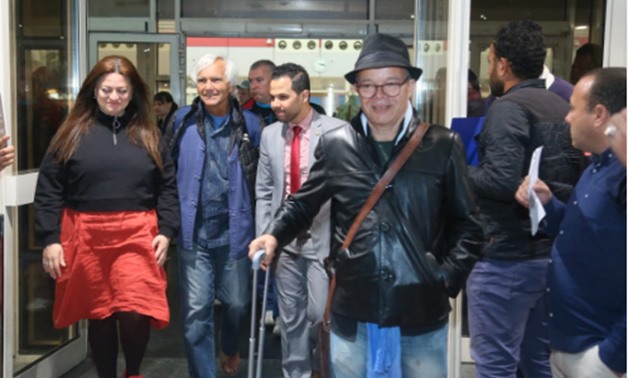
FILE - Eugenio Barba once arriving to Sharm El Sheikh.
CAIRO - 1 April 2019: The world's leading theater man Eugenio Barba arrived in Sharm El Sheikh April 1, as he is set to be to honored during the opening ceremony of the 4th Sharm El-Sheikh International Theater Festival for Youth. Barba was greeted by the festival’s president Mazen el-Gharbawy and Nora Amin the general coordinator of the festival.
Actress, composer and director Julia Varley, Barba’s partner and colleague at the Oudin Theater was accompanying the veteran theatrical icon. Varley will present a practical lecture inspired by her work on dramaturgy; through meeting with Egyptian, Arab and international actors - aiming to present Varley’s method of acting through voice, movement, presence, embodiment and coloring.
After his honoring, Barba is set to give a speech to the attendees, as he resembles a symbol for all artists worldwide.
Barba is an Italian author and theatre director based in Denmark. He is the founder of the Odin Theatre and the International School of Theatre Anthropology, both located in Holstebro, Denmark.
Although Barba was born in Brindisi, he grew up in Gallipoli in the Province of Lecce, where his family originated from. His family’s socio-economic situation changed significantly when his father, a military officer, was wounded in the Second World War and died soon after.
Upon completing high school at the Nunziatella military academy of Naples in 1954, he abandoned the idea of following his father into the military. Instead, in 1954, he immigrated to Norway to work as a welder and a sailor.
The renowned theatrical figure also took a degree in French and Norwegian literature, and history of religion at Oslo University.
In 1961, he went to Warsaw, Poland to study theatre direction at the State Theatre School, but left one year later to join Jerzy Grotowski, who at that time was the leader of Teatr 13 Rzędów in Opole. Barba stayed with Grotowski for three years.
In 1963, he traveled to India where he had his first encounter with Kathakali, a theatre form which had received little attention in the West up to that time. Barba wrote an essay on Kathakali which was published in Italy, France, the USA and Denmark.
His first book, "Grotowski in search of a Lost Theatre", was published in Italy and Hungary in 1965.
When Barba returned to Oslo in 1964, he aimed to become a professional theatre director, but as he was a foreigner, he was not welcome in the profession. In this period he became a close friend to Norwegian author and rebel Jens Bjørneboe with whom he wanted to start the theatre group.
Together, they gathered a group of young people who had not passed their admission test to Oslo’s State Theatre School, and created the Odin Teatret on October 1, 1964.
The group trained and rehearsed in an air raid shelter. Their first production, “Ornitofilene”, by Norwegian author Jens Bjørneboe, was performed in Norway, Sweden, Finland and Denmark.
They were subsequently invited by the Danish municipality of Holstebro, a small town in the Northwest, to create a theatre laboratory there. They were offered an old farm and a small sum of money to set them started. Since then, Barba and his colleagues have made Holstebro the base for the Odin Teatret.
During the past forty two years Eugenio Barba has directed 65 productions with Odin Teatret and the Theatrum Mundi Ensemble, some of which have required up to two years of preparation.
Among the best known productions are “Ferai” (1969), “Min Fars Hus” (My Father’s House) (1972), “Brecht’s Ashes” (1980), “The Gospel According to Oxyrhynchus” (1985), “Talabot” (1988), “Itsi Bitsi” (1991), “Kaosmos” (1993) and “Mythos” (1998).
Some of the more recent productions are “Salt” (2002), “Great Cities under the Moon” (2003), “Andersen's Dream” (2005), “Ur-Hamlet” (2006) and “Don Giovanni all'Inferno” (2006) in collaboration with Ensemble Midtvest.
Since 1974, Eugenio Barba and Odin Teatret have devised their own way of being present in a social context through the practice of theatre "barter", an exchange through performance with a community.
In 1979, Barba founded the International School of Theatre Anthropology (ISTA). He is on the advisory boards of scholarly journals such as The Drama Review, Performance Research, New Theatre Quarterly, Teatro e Storia and Teatrología.
Among his most recent publications, translated into several different languages, are “The Paper Canoe” (Routledge), “Theatre: Solitude, Craft, Revolt” (Black Mountain Press), “Land of Ashes and Diamonds”, “My Apprenticeship in Poland”, followed by 26 letters from Jerzy Grotowski to Eugenio Barba (Black Mountain Press) and, in collaboration with Nicola Savarese, “The Secret Art of the Performer” and the revised an updated version: "A Dictionary of Theatre Anthropology" (Centre for Performance Research/ Routledge).

Comments
Leave a Comment